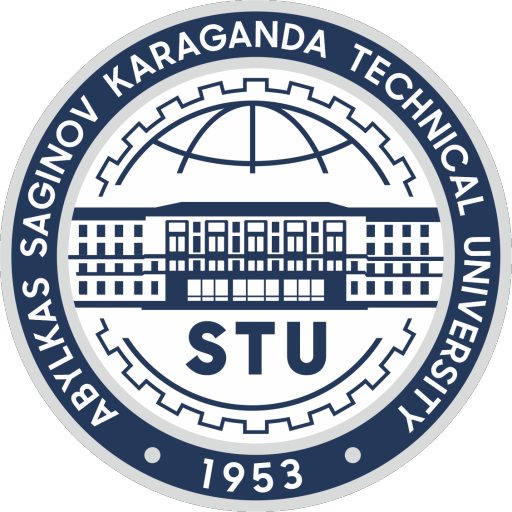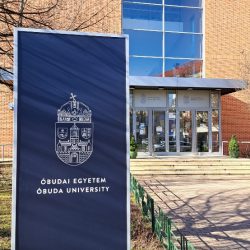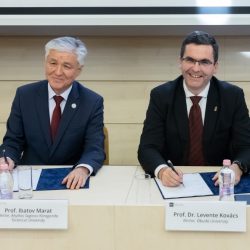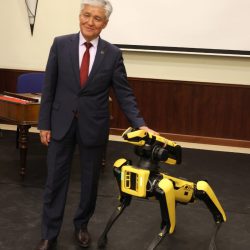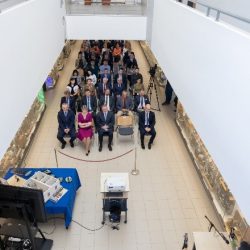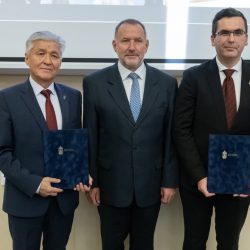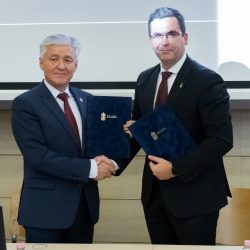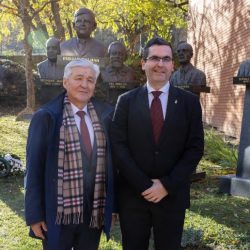The delegation of Abylkas Saginov Karaganda Technical University headed by the chairman of the Board – Rector, dsc., professor M.K. Ibatov, visited Obuda University (Budapest, Hungary) as part of a working visit and took part in events dedicated to the university Day at Obuda University.
These events were also attended by Mihai Varga, the minister of finance, and Andrasz Czer-Palkovic, the mayor of Szekesfehervar, and representatives of a number of universities from near and far abroad.
As part of these events, the Szekesfehervar science and innovation park and the Industrial Science and Innovation park of the future in the city of Zhambek were opened, which represent innovation centers in Hungary, focused on the long-term development of the national industry.
During visit, the rectors of Abylkas Saginov Karaganda Technical University, Marat Ibatov and Obuda University Levente Kovacs, entered into a cooperation agreement, expanding the scope of double-diploma education at the master’s level in the field of machine learning and data analysis, which will result in the introduction of artificial intelligence technologies into the industry of the Republic of Kazakhstan and Hungary . The signing ceremony of the agreement was attended by the deputy secretary of state and minister of finance of Hungary, the attache of the Ambassador of the Republic of Kazakhstan to Hungary and other guests. It should be noted that Obuda University is among the TOP 3 European universities leading in the field of artificial intelligence, as well as in the TOP 601-800 of the world ranking of Times Higher Education by Subject Computer Science.
An agreement was also reached to hold a joint international scientific conference IEEE Hungary on the basis of Abylkas Saginov Karaganda Technical University, the collections of which will be indexed in the Scopus and Web of Science databases. This conference is planned for the participation of foreign scientists whose index will be from 60 to 140.
The main goal of the conference is to exchange experiences with professionals in their field, develop knowledge and perspectives on specific topics, expand your professional network and contribute to finding answers to questions on the latest trends in IT. The conference will serve to develop the collaboration of world scientists, and will also provide an opportunity for scientists of Abylkas Saginov Karaganda Technical University to become part of the Institute of electrical and electronics engineers – IEEE (Institute of Electrical and Electronics Engineers), which develops widely used standards in the world for radio electronics, electrical engineering and hardware for computer systems and networks.
Also, Abylkas Saginov Karaganda Technical University, took part in the Times Higher Education conference “Reputation matters: strategies for growing global reputation”, dedicated to the role of bibliometric indicators in university rankings in Times Higher Education.
Based on the triple helix method widely used in european education, Obuda University proposed an innovative 5 helix model, emphasizing the public purpose of universities and their contribution to the development of international cooperation.
Thanks to the support of the Ministry of science and higher education of the Republic of Kazakhstan, Abylkas Saginov Karaganda Technical University is moving to a qualitatively new level of international cooperation and strategic partnership with leading universities in the world with the aim of more active participation of teaching staff and students in the innovation and research activities of the global academic and scientific community in the field of information technology, artificial intelligence, industry 4.0, green energy, engineering and environmental protection, as well as the development of faculty and postdoctoral exchange programs, in recognition of the importance of educational, cultural and scientific exchanges between universities.
